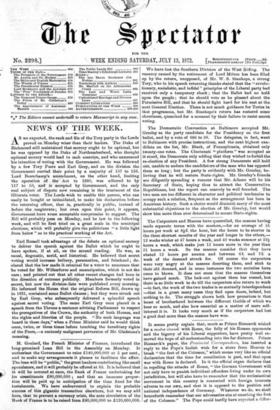Earl Russell took advantage of the debate on optional secrecy
to deliver the speech against the Ballot which he ought to have spoken, if at all, on the second reading. He was, as sisual, dogmatic, acrid, and historical. He believed that secret -voting would increase bribery, personation, and falsehood ; de- 'dared that the law made it criminal for a voter to announce that be voted for Mr. Wilberforce and emancipation, which is not the case ; and pointed out that all other recent changes had been in the direction of extreme publicity. Members formerly voted in secret, but now the division-lists were published every morning. He informed the House that the original Reform Bill, drawn up in 1831, contained some Ballot clauses ; but they were struck out by Earl Grey, who subsequently delivered a splendid speech against secret voting. The same Earl Grey once placed in a speech from the Throne a sentence advising Parliament to respect the prerogatives of the Crown, the authority of both Houses, and the rights and liberties of the people. "No such language was heard in these days," when a Prime Minister said he would think once, twice, or three times before touching the hereditary rights of the Peers,—a curiously malignant perversion of Mr. Gladstone's meaning.


































